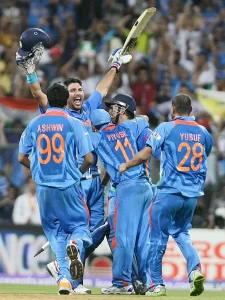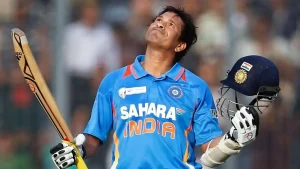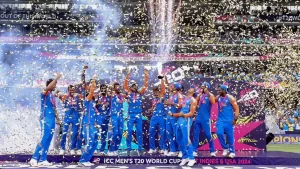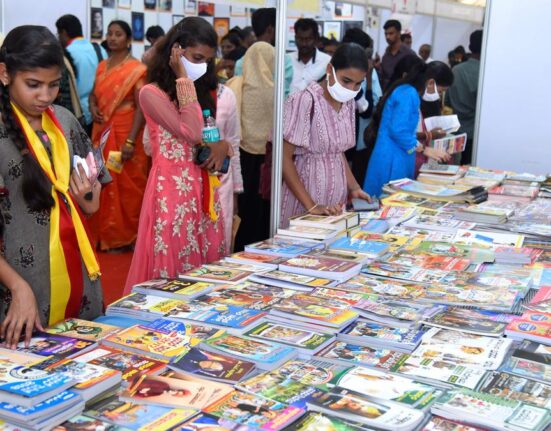
Cricket operates in India beyond being a traditional sport because it represents a social expression and serves as a spirituality embraced by numerous fans. Thousands of Indians feel deep passionate love toward cricket because many psychological elements derived from social structure and emotional ties and cultural practices contribute to this devotion. This article aims to examine how cricket became the one sport that Indian fans cherish so deeply through the study of their psychological connections to the game.
The status of cricket as a powerful symbol in Indian culture stands as the most essential factor driving its immense popularity throughout the nation. The sport moves past boundaries of language and religion and region because it brings Indians together under the three colors of the flag. The Indian cricket team carries the flag of national pride during every match. International tournament triumphs create nationwide joy and accomplish collective national milestones which bonds different people together through shared identities. Cricket unites spectators through its bonding power which creates deep feelings of local pride among its followers.
Through cricket Indian people find the opportunity to relieve themselves from their ongoing life burdens. Cricket offers fans an experience of excitement which distracts them from their daily life concerns during the entire game period. A tightly contested match transforms into an emotional journey that produces overwhelming happiness along with crushing sadness and powerful desire and strong enthusiasm which unites devotees to their favorite sport. The emotional bond with cricket plays an essential role in the obsession since cricket takes on the role of comfort and happiness during the chaotic nature of daily life.
The Indian public treats their cricket athletes with divinity. The cricket world looks at Sachin Tendulkar, MS Dhoni and Virat Kohli as more than athletes as they serve as inspirational figures to numerous people worldwide. Players succeed in having profound impacts on their fans because followers can witness parts of themselves within these athletes. People become obsessed because they connect emotionally with inspirational stories of athletes who rise above obstacles toward great accomplishments. Fans develop a stronger relationship with cricket because cricketer idolization produces motivational hope.

Cricket fosters a sense of community and social bonding. Every casual street game together with watching matches on TV and team conversation helps cricket produce joint experiences between players which deepens friendships. Sports functions as social bond which unites people irrespective of their original identities. The social element of cricket brings increased appeal because viewers gain joy from both celebrating team wins and discussing their emotional moments from the game.
People use various practices including sporting team jerseys and cooking snacks and practicing luck rituals to make cricket matches more thrilling before the start. Traditions observed during cricket games establish a feeling of group identity which enhances the overall experience. Supporters commonly create their own lucky rituals, believing their behaviors can sway game results which intensifies their feelings about the event. The combination of traditional fan behavior and superstitions strengthens cricket experiences so people consider this activity an essential aspect of their existence.
Cricket has become highly accessible through increased media coverage because of television broadcasts and digital platforms. The steady stream of match coverage and player interviews and match analysis retains fans in a state of active interest. Through social media fans connect and exchange views and participate in collective triumph celebrations which builds a digital association of cricket enthusiasts. The widespread accessibility of cricket turning it into a constant and beloved part of Indian daily life has permanently established its status as an important national pastime.
Indian cricket players now find lucrative career paths because of the financial success displayed through the Indian Premier League (IPL). The growing interest among young people represents a new phenomenon because they wish to pursue professional cricket careers. The belief that cricket fame brings with it fortune drives the obsession because children and parents both devote resources to develop cricket skills. Having a successful career in cricket serves to deepen the widespread enthusiasm for the sport.

The unpredictable sequence of events in cricket combined with thrilling spectacles during matches produces intense suspense among spectators. A final victory in last minutes or exceptional matches deliver euphoric experiences that generate powerful adrenaline but remain impossible to reproduce. Sport fans become addicted to this thrilling experience thus driving them to watch additional matches. The combination of upcoming matches alongside their unpredictable nature keeps cricket extraordinary for spectators.
The Indian attachment to cricket consists of four primary factors which unite in a complex web including national identity and emotional responses as well as social relationships and competitive excitement. Cricket connects people across all limitations because it brings together all feelings between happiness and sadness and optimism with pessimism. Analysis of this psychological phenomenon allows people to better understand both the sport and its immense effect on widespread Indian society. Cricket serves beyond being an Indian sport because Indians treat it as a ceremonial celebration of everything that constitutes existence.












